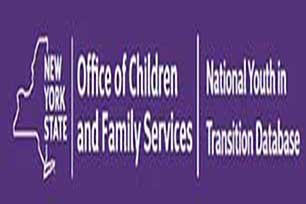National Youth in Transition Database
The Office of Children and Family Services (OCFS) has partnered with the Center for Technology in Government (CTG/SUNY Albany) to create a data collection strategy for the National Youth in Transition Database (NYTD) reporting system. The NYTD is a national effort to meet a data collection mandate included in the Chafee Foster Care Independence Program of the Social Security Act.
Unlike other data collection and reporting requirements from ACF that focus on using administrative data, the NYTD requires getting answers directly from youth who turn 17 while in foster care. The NYTD offers an opportunity for youth to provide basic information about their employment, education, health care situation, and other services received.
The mandate is on the state governments, not on the youth themselves. Therefore, youth participation in the NYTD is voluntary. However, our goal is to provide every youth with an opportunity to be heard. Please visit the NYTD New York website for more information.
The Opportunity and Challenge of Collecting Street-level Information (Issue Brief)
With the hope of changing the lives of youth in foster care, in 1999 the U.S. Congress enacted the Foster Care Independence Act, also known as the Chaffee Independent Living Act (Act). The Act provided $140 million in block grants to states to support youths’ transitions to independent living and required the Federal Administration for Children and Families (ACF) to develop a national data collection and reporting system. The system, known as the National Youth in Transition Database (NYTD), seeks to track outcomes of youth receiving independent living services and to trace certain youth outcomes over time, even as they age out of the foster care system.
The NYTD follows a long history of federally mandated reporting systems. However, it is the first national, longitudinal data collection effort focused on gathering data directly from the youths themselves, and not just defaulting to administrative data as the source of evidence.
http://www.ctg.albany.edu/publications/issuebriefs/nytd
Scope of Work
This project aims to develop a data collection strategy for the National Youth in Transition Database survey. Using the final data requirements of the Foster Care Independence Act of 1999 as incorporated into the Social Security Act, CTG will collect data for the baseline and follow-up cohorts over the course of five years. CTG will create a survey that meets the federal mandate, including any additional questions that improve the tracking of youth for future surveys.
The NYTD will incorporate a complex strategy of data sharing and analysis, survey population management, and youth outreach. This project requires that CTG and OCFS develop strong relationships with caseworkers and foster care youth in order to effectively assess the quality and effectiveness of independent living services in New York. By the end of the project, CTG will provide OCFS with the necessary data collection components and program management resources needed to continue the implementation of the NYTD.
Partners
The Center for Technology in Government is responsible for the data collection efforts of NYTD through November 2015. CTG is currently working with OCFS and SUNY Stony Brook to administer the survey, compile the results, and process the survey data.
New York State Office of Children and Family Services (OCFS)
OCFS is the state agency responsible for implementing the NYTD in New York State.
http://www.ocfs.state.ny.us/main/
The Center for Technology in Government (CTG) - University at Albany/SUNY
CTG is responsible for the portions of the NYTD data collection that directly ask for youth participation.
https://www.ctg.albany.edu/
Center for Survey Research (CSR) - SUNY Stony Brook
Stony Brook’s CSR has sub-contracted with CTG to conduct all phone interviews with the youth for the NYTD.
http://www.stonybrook.edu/surveys/NewCSR/
Funding Sources
This project is funded by the New York State Office of Children and Family Services (OCFS).
